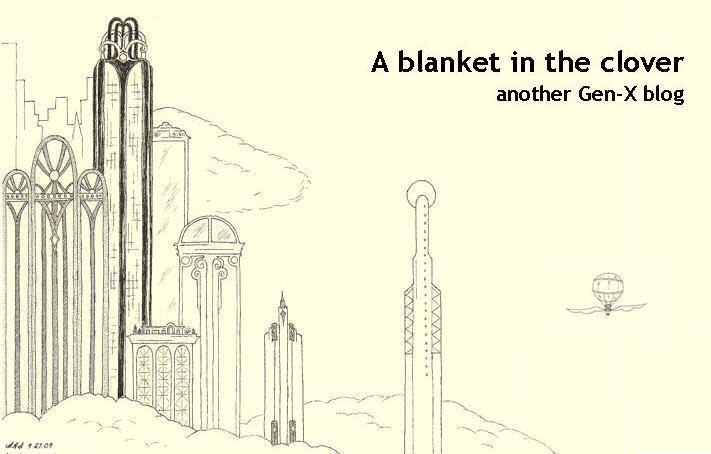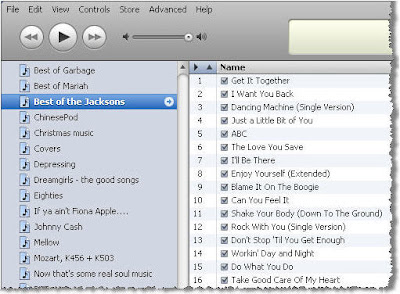Michael is working with the show's musical director on a slow, sultry version of "The Way You Make Me Feel."
The musical director is tapping the melody out on a keyboard but not getting the tempo exactly like Michael wants it. Frustrations seem to be building ever so slightly when the musical director says that he'll need explicit guidance if Michael wants, for example, "more booty in it." With that, MJ cracks up, and they try again, with everything seeming to go well until Michael puts out his hands in a "stop" gesture and says, gently but firmly, "You've got to let it simmer!"
 This moment epitomizes what I loved about "This Is It." The film offers an intimate glimpse into Michael Jackson's creative process, and the picture is one of wit, perfectionism that's exacting but always professional, and of course great talent.
This moment epitomizes what I loved about "This Is It." The film offers an intimate glimpse into Michael Jackson's creative process, and the picture is one of wit, perfectionism that's exacting but always professional, and of course great talent.If you want to see Michael belt it out, you might be slightly disappointed, as throughout the movie it's clear he's saving his voice for the main event that never came. Still, there's a lot to like about the movie's music and dance. You just have to be patient and take the glorious moments when they come, sometimes in surprising places: The dance he does during an extended ending of "Billie Jean" is tremendously cool (and made better by the small cluster of awestruck dancers cheering him on). The rehearsal of "Human Nature" — especially the way he says "I like lovin' this way" — is fierce. With "I Just Can't Stop Loving You," he and backup singer Judith Hill luxuriate in an exceptionally drawn-out ending that seems pretty close to perfect. (By the way, if you feel like being sad, check out her memorial tribute song to Michael.)
The movie also offers insightful peeks at the man behind the music — his work style and inspirations. I liked watching him work with the young blonde guitar player on "Black or White," encouraging her that "this is your time to shine." Also good is a moment during "Smooth Criminal" where director Kenny Ortega points out that the staging Michael wants to use means that he won't be able to see an important visual queue — it will be happening behind him. "Yeah," Michael says, in what seems like complete seriousness, "I gotta feel that." It's cute, too, near the end of the film when Ortega makes some big sweeping movements with his arms, looking a bit like he's pointing toward the emergency exits on a plane, and Michael enthuses, "I love when the stewardesses do that!"
A pleasant surprise was seeing some of the other artists, particularly the dancers. The movie opens with scenes of the dance auditions, and it's a great sequence — very "A Chorus Line" (Michael even says "She's the one!"). From there on, the dancers are impressive. I particularly liked the snippet of one, I think it was Travis Payne, dancing in the foreground during "Shake Your Body." I also liked Mekia Cox, who is the object of Michael's advances during "The Way You Make Me Feel." She plays that part perfectly, and it looks like she's having so much fun.
I don't want to go off on too much of a tangent, but concurrent with seeing this movie, I went back and re-read the cover story from this summer's Rolling Stone special edition on Michael, and I was surprised at how much the piece annoyed me the second time around. I still like certain things about it, but, fresh after having seen the movie, I was especially turned off by the following passage:
"That [the 1983 Motown anniversary show] was the last truly blessed moment in Michael Jackson's life. After that, everything became argument and recrimination. And in time, decay."
I don't know exactly how that dramatic statement is meant to be interpreted, but "This Is It" seems a stark contradiction to any suggestion that Michael's later years were ones of "decay." Certainly anyone who watches this movie will see that he was, up until the end, an artist in full control of his considerable gifts, someone who inspired others, not to mention a person of humor and kindness.
You really get a sense of this near the end of the film when Michael and the rest of the performers gather in a circle, and he talks about his reasons for doing the concert, how he wants to bring audiences a positive message about caring for one another and the Earth, and to convey some "love."
Judging from the cheers, singing, and spontaneous applause that burst out in the theater the two times I saw it, I'd say mission accomplished.








.jpg)





